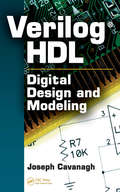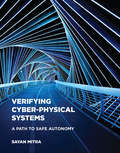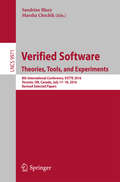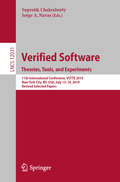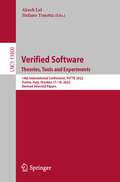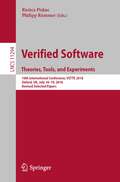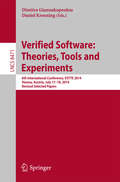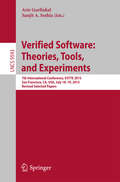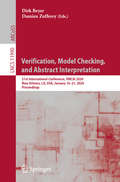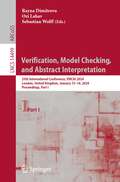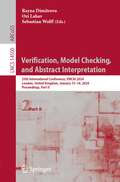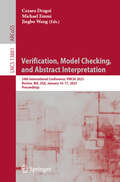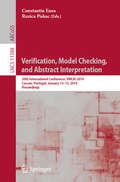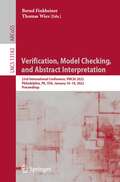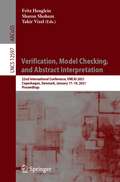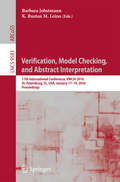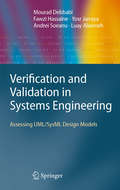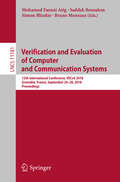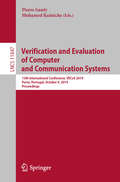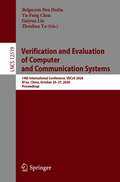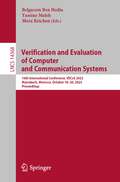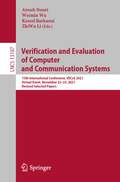- Table View
- List View
Verilog HDL: Digital Design and Modeling
by Joseph Cavanagh<p>Emphasizing the detailed design of various Verilog projects, Verilog HDL: Digital Design and Modeling offers students a firm foundation on the subject matter. The textbook presents the complete Verilog language by describing different modeling constructs supported by Verilog and by providing numerous design examples and problems in each chapter. Examples include counters of different moduli, half adders, full adders, a carry lookahead adder, array multipliers, different types of Moore and Mealy machines, and much more. <p>The text also contains information on synchronous and asynchronous sequential machines, including pulse-mode asynchronous sequential machines. In addition, it provides descriptions of the design module, the test bench module, the outputs obtained from the simulator, and the waveforms obtained from the simulator illustrating the complete functional operation of the design. Where applicable, a detailed review of the topic's theory is presented together with logic design principles, including state diagrams, Karnaugh maps, equations, and the logic diagram. Verilog HDL: Digital Design and Modeling is a comprehensive, self-contained, and inclusive textbook that carries all designs through to completion, preparing students to thoroughly understand this popular hardware description language.</p>
Verifying Cyber-Physical Systems: A Path to Safe Autonomy (Cyber Physical Systems Series)
by Sayan MitraA graduate-level textbook that presents a unified mathematical framework for modeling and analyzing cyber-physical systems, with a strong focus on verification.Verification aims to establish whether a system meets a set of requirements. For such cyber-physical systems as driverless cars, autonomous spacecraft, and air-traffic management systems, verification is key to building safe systems with high levels of assurance. This graduate-level textbook presents a unified mathematical framework for modeling and analyzing cyber-physical systems, with a strong focus on verification. It distills the ideas and algorithms that have emerged from more than three decades of research and have led to the creation of industrial-scale modeling and verification techniques for cyber-physical systems.The book discusses such computer science concepts as undecidability and abstractions, alongside concepts from control theory including multiple Lyapunov functions and barrier certificates, all within a unified mathematical language. It explains algorithms for reachability analysis, counter-example guided abstraction refinement, and data-driven verification, as well as the key data structures that enable their effective implementation. Other topics include invariants, deductive verification, progress analysis, sensitivity analysis, simulation relations, fairness, model checking, satisfiability modulo theories, temporal logics, compositional reasoning, convergence analysis, asynchronous processes, and verification of black-box systems.The book provides more than twenty examples of cyber-physical verification, ranging from conceptual models to advanced driving-assist systems. Each chapter offers exercise problems; supporting materials, including slides, simulation code, additional exercises, and solutions are available on the book's website.
Verified Software. Theories, Tools, and Experiments
by Sandrine Blazy Marsha ChechikThis volume constitutes the thoroughly refereed post-conference proceedings of the 8th International Conference on Verified Software: Theories, Tools and Experiments, VSTTE 2016, held in July 2016 in Toronto, ON, Canada. The 8 full papers together with 4 short papers and 5 invited papers presented were carefully revised and selected 21 submissions. The goal of the VSTTE conference is to advance the state of the art through the interaction of theory development, tool evolution, and experimental validation.
Verified Software. Theories, Tools, and Experiments: 11th International Conference, VSTTE 2019, New York City, NY, USA, July 13–14, 2019, Revised Selected Papers (Lecture Notes in Computer Science #12031)
by Supratik Chakraborty Jorge A. NavasThis volume constitutes the thoroughly refereed post-conference proceedings of the 11th International Conference on Verified Software: Theories, Tools, and Experiments, VSTTE 2019, held in New York City, NY, USA, in July 2019.The 9 full papers presented were carefully revised and selected from 17 submissions. The papers describe large-scale verification efforts that involve collaboration, theory unification, tool integration, and formalized domain knowledge as well as novel experiments and case studies evaluating verification techniques and technologies.
Verified Software. Theories, Tools and Experiments.: 14th International Conference, VSTTE 2022, Trento, Italy, October 17–18, 2022, Revised Selected Papers (Lecture Notes in Computer Science #13800)
by Akash Lal Stefano TonettaThis book constitutes the refereed proceedings of the 14th International Conference on Verified Software. Theories, Tools and Experiments, VSTTE 2022 held in Trento, Italy, during October 17–18, 2022.The 9 papers presented in this volume were carefully reviewed and selected from 20 submissions. The papers describe software verification efforts that involve collaboration, theory unification, tool integration, and formalized domain knowledge as well as novel experiments and case studies evaluating verification techniques and technologies.
Verified Software. Theories, Tools, and Experiments: 10th International Conference, VSTTE 2018, Oxford, UK, July 18–19, 2018, Revised Selected Papers (Lecture Notes in Computer Science #11294)
by Ruzica Piskac Philipp RümmerThis volume constitutes the thoroughly refereed post-conference proceedings of the 10th International Conference on Verified Software: Theories, Tools, and Experiments, VSTTE 2018, held in Oxford, UK, in July 2018.The 19 full papers presented were carefully revised and selected from 24 submissions. The papers describe large-scale verification efforts that involve collaboration, theory unification, tool integration, and formalized domain knowledge as well as novel experiments and case studies evaluating verification techniques and technologies.
Verified Software: Theories, Tools and Experiments
by Dimitra Giannakopoulou Daniel KroeningThis volume constitutes the thoroughly refereed post-conference proceedings of the 6th International Conference on Verified Software: Theories, Tools and Experiments, VSTTE 2014, held in July 2014 at the Vienna Summer of Logic in Vienna, Austria, as an associated event of CAV 2014, the International Conference on Computer-Aided Verification. The 17 revised full papers presented were carefully revised and selected from 34 submissions. The papers are organized in topical sections such as analysis: understanding and explanation; verification frameworks and applications; hypervisors and dynamic data structures; certification; real time and security.
Verified Software: Theories, Tools, and Experiments
by Sanjit A. Seshia Arie GurfinkelThis volume constitutes the thoroughly refereed post-conference proceedings of the 7th International Conference on Verified Software: Theories, Tools and Experiments, VSTTE 2015, held in July 2015 in San Francisco, CA, USA. The 12 revised full papers presented were carefully revised and selected from 25 submissions. The goal of this conference is to advance the state of the art in the science and technology of software verification, through the interaction of theory development, tool evolution, and experimental validation and large-scale verification efforts that involve collaboration, theory unification, tool integration, and formalized domain knowledge.
Verified: How to Think Straight, Get Duped Less, and Make Better Decisions about What to Believe Online
by Mike Caulfield Sam WineburgAn indispensable guide for telling fact from fiction on the internet—often in less than 30 seconds. The internet brings information to our fingertips almost instantly. The result is that we often jump to thinking too fast, without taking a few moments to verify the source before engaging with a claim or viral piece of media. Information literacy expert Mike Caulfield and educational researcher Sam Wineburg are here to enable us to take a moment for due diligence with this informative, approachable guide to the internet. With this illustrated tool kit, you will learn to identify red flags, get quick context, and make better use of common websites like Google and Wikipedia that can help and hinder in equal measure. This how-to guide will teach you how to use the web to verify the web, quickly and efficiently, including how to • Verify news stories and other events in as little as thirty seconds (seriously) • Determine if the article you’re citing is by a reputable scholar or a quack • Detect the slippery tactics scammers use to make their sites look credible • Decide in a minute if that shocking video is truly shocking • Deduce who’s behind a site—even when its ownership is cleverly disguised • Uncover if that feature story is actually a piece planted by a foreign government • Use Wikipedia wisely to gain a foothold on new topics and leads for digging deeper And so much more. Building on techniques like SIFT and lateral reading, Verified will help students and anyone else looking to get a handle on the internet’s endless flood of information through quick, practical, and accessible steps.
Verification, Model Checking, and Abstract Interpretation: 21st International Conference, VMCAI 2020, New Orleans, LA, USA, January 16–21, 2020, Proceedings (Lecture Notes in Computer Science #11990)
by Dirk Beyer Damien ZuffereyThis book constitutes the proceedings of the 21st International Conference on Verification, Model Checking, and Abstract Interpretation, VMCAI 2020. The 21 papers presented in this volume were carefully reviewed from 44 submissions. VMCAI provides a forum for researchers from the communities of verification, model checking, and abstract Interpretation, facilitating interaction, cross-fertilization, and advancement of hybrid methods that combine these and related areas.
Verification, Model Checking, and Abstract Interpretation: 25th International Conference, VMCAI 2024, London, United Kingdom, January 15–16, 2024, Proceedings, Part I (Lecture Notes in Computer Science #14499)
by Rayna Dimitrova Ori Lahav Sebastian WolffThe two-volume set LNCS 14499 and 14500 constitutes the proceedings of the 25th International Conference on Verification, Model Checking, and Abstract Interpretation, VMCAI 2024, which took place in London, Ontario, Canada, in January 2024. The 30 full papers presented in the proceedings were carefully reviewed and selected from 74 submissions. They were organized in topical sections as follows:Part I: Abstract interpretation; infinite-state systems; model checking and synthesis; SAT, SMT, and automated reasoning; Part II: Concurrency; neural networks; probabilistic and quantum programs; program and system verification; runtime verification; security and privacy.
Verification, Model Checking, and Abstract Interpretation: 25th International Conference, VMCAI 2024, London, United Kingdom, January 15–16, 2024, Proceedings, Part II (Lecture Notes in Computer Science #14500)
by Rayna Dimitrova Ori Lahav Sebastian WolffThe two-volume set LNCS 14499 and 14500 constitutes the proceedings of the 25th International Conference on Verification, Model Checking, and Abstract Interpretation, VMCAI 2024, which took place in London, Ontario, Canada, in January 2024. The 30 full papers presented in the proceedings were carefully reviewed and selected from 74 submissions. They were organized in topical sections as follows:Part I: Abstract interpretation; infinite-state systems; model checking and synthesis; SAT, SMT, and automated reasoning; Part II: Concurrency; neural networks; probabilistic and quantum programs; program and system verification; runtime verification; security and privacy;
Verification, Model Checking, and Abstract Interpretation: 24th International Conference, VMCAI 2023, Boston, MA, USA, January 16–17, 2023, Proceedings (Lecture Notes in Computer Science #13881)
by Cezara Dragoi Michael Emmi Jingbo WangThis book constitutes the proceedings of the 24th International Conference on Verification, Model Checking, and Abstract Interpretation, VMCAI 2023, which took place in Boston, USA, in January 2023. The 17 full papers presented in this book were carefully reviewed and selected from 34 submissions. The contributions deal with program verification, model checking, abstract interpretation, program synthesis, static analysis, type systems, deductive methods, decision procedures, theorem proving, program certification, debugging techniques, program transformation, optimization, and hybrid and cyber-physical systems.
Verification, Model Checking, and Abstract Interpretation: 20th International Conference, VMCAI 2019, Cascais, Portugal, January 13–15, 2019, Proceedings (Lecture Notes in Computer Science #11388)
by Constantin Enea Ruzica PiskacThis book constitutes the refereed proceedings of the 20th International Conference on Verification, Model Checking, and Abstract Interpretation, VMCAI 2019, held in Cascais, Portugal, in January 2019.The 27 full papers presented together with the abstracts of 3 invited keynote talks were carefully reviewed and selected from 62 submissions. VMCAI provides topics including: program verification, model checking, abstract interpretation, program synthesis, static analysis, type systems, deductive methods, program certification, decision procedures, theorem proving, program certification, debugging techniques, program transformation, optimization, and hybrid and cyber-physical systems.
Verification, Model Checking, and Abstract Interpretation: 23rd International Conference, VMCAI 2022, Philadelphia, PA, USA, January 16–18, 2022, Proceedings (Lecture Notes in Computer Science #13182)
by Bernd Finkbeiner Thomas WiesThis book constitutes the proceedings of the 23rd International Conference on Verification, Model Checking, and Abstract Interpretation, VMCAI 2022, which took place in Philadelphia, PA, USA, in January 2022.The 22 papers presented in this volume were carefully reviewed from 48 submissions. VMCAI provides a forum for researchers working on verification, model checking, and abstract interpretation and facilitates interaction, cross-fertilization, and advancement of hybrid methods that combine these and related areas.
Verification, Model Checking, and Abstract Interpretation: 22nd International Conference, VMCAI 2021, Copenhagen, Denmark, January 17–19, 2021, Proceedings (Lecture Notes in Computer Science #12597)
by Fritz Henglein Sharon Shoham Yakir VizelThis book constitutes the proceedings of the 22nd International Conference on Verification, Model Checking, and Abstract Interpretation, VMCAI 2021, which was held virtually during January 17-19, 2021. The conference was planned to take place in Copenhagen, Denmark, but changed to an online event due to the COVID-19 pandemic. The 23 papers presented in this volume were carefully reviewed from 48 submissions. VMCAI provides a forum for researchers working on verification, model checking, and abstract interpretation and facilitates interaction, cross-fertilization, and advancement of hybrid methods that combine these and related areas. The papers presented in this volume were organized in the following topical sections: hyperproperties and infinite-state systems; concurrent and distributed systems; checking; synthesis and repair; applications; and decision procedures.
Verification, Model Checking, and Abstract Interpretation
by Barbara Jobstmann K. Rustan M. LeinoThis book constitutes the refereed proceedings of the 17th International Conference on Verification, Model Checking, and Abstract Interpretation, VMCAI 2016, held in St. Petersburg, FL, USA, in January 2016. The 24 full papers together with 2 invited talks and 1 abstract presented were carefully reviewed and selected from 67 submissions. VMCAI provides topics including: program verification, model checking, abstract interpretation and abstract domains, program synthesis, static analysis, type systems, deductive methods, program certification, debugging techniques, program transformation, optimization, hybrid and cyber-physical systems.
Verification and Validation in Systems Engineering: Assessing UML/SysML Design Models
by Yosr Jarraya Luay Alawneh Andrei Soeanu Fawzi Hassaïne Mourad DebbabiVerification and validation represents an important process used for the quality assessment of engineered systems and their compliance with the requirements established at the beginning of or during the development cycle. Debbabi and his coauthors investigate methodologies and techniques that can be employed for the automatic verification and validation of systems engineering design models expressed in standardized modeling languages. Their presentation includes a bird's eye view of the most prominent modeling languages for software and systems engineering, namely the Unified Modeling Language (UML) and the more recent Systems Modeling Language (SysML). Moreover, it elaborates on a number of quantitative and qualitative techniques that synergistically combine automatic verification techniques, program analysis, and software engineering quantitative methods applicable to design models described in these modeling languages. Each of these techniques is additionally explained using a case study highlighting the process, its results, and resulting changes in the system design. Researchers in academia and industry as well as students specializing in software and systems engineering will find here an overview of state-of-the-art validation and verification techniques. Due to their close association with the UML standard, the presented approaches are also applicable to industrial software development.
Verification and Validation in Scientific Computing
by William L. Oberkampf Christopher J. RoyAdvances in scientific computing have made modelling and simulation an important part of the decision-making process in engineering, science, and public policy. This book provides a comprehensive and systematic development of the basic concepts, principles, and procedures for verification and validation of models and simulations. The emphasis is placed on models that are described by partial differential and integral equations and the simulations that result from their numerical solution. The methods described can be applied to a wide range of technical fields, from the physical sciences, engineering and technology and industry, through to environmental regulations and safety, product and plant safety, financial investing, and governmental regulations. This book will be genuinely welcomed by researchers, practitioners, and decision makers in a broad range of fields, who seek to improve the credibility and reliability of simulation results. It will also be appropriate either for university courses or for independent study.
Verification and Evaluation of Computer and Communication Systems: 12th International Conference, VECoS 2018, Grenoble, France, September 26–28, 2018, Proceedings (Lecture Notes in Computer Science #11181)
by Mohamed Faouzi Atig Saddek Bensalem Simon Bliudze Bruno MonsuezThis book constitutes the proceedings of the 12th International Conference on Verification and Evaluation of Computer and Communication Systems ( VECoS 2018) held at Grenoble, France, in September 2018. The 11 full papers in this volume, presented together with one abstract and two invited papers, were carefully reviewed and selected from 23 submissions. The aim of the VECoS conference is to bring together researchers and practitioners in the areas of verification, control, performance, and dependability evaluation in order to discuss state of the art and challenges in modern computer and communication systems in which functional and extra-functional properties are strongly interrelated. Thus, the main motivation for VECoS is to encourage the cross-fertilization between various formal verification and evaluation approaches, methods and techniques, and especially those developed for concurrent and distributed hardware/software systems.
Verification and Evaluation of Computer and Communication Systems: 13th International Conference, VECoS 2019, Porto, Portugal, October 9, 2019, Proceedings (Lecture Notes in Computer Science #11847)
by Pierre Ganty Mohamed KaânicheThis book constitutes the proceedings of the 13th International Conference on Verification and Evaluation of Computer and Communication Systems ( VECoS 2019), held in Porto, Portugal, in October 2019. The 7 full papers in this volume, presented together with two invited talks, were carefully reviewed and selected from 13 submissions. The aim of the VECoS conference is to bring together researchers and practitioners in the areas of verification, control, performance, and dependability evaluation in order to discuss state of the art and challenges in modern computer and communication systems in which functional and extra-functional properties are strongly interrelated. Thus, the main motivation for VECoS is to encourage the cross-fertilization between various formal verification and evaluation approaches, methods and techniques, and especially those developed for concurrent and distributed hardware/software systems.
Verification and Evaluation of Computer and Communication Systems: 14th International Conference, VECoS 2020, Xi'an, China, October 26–27, 2020, Proceedings (Lecture Notes in Computer Science #12519)
by Belgacem Ben Hedia Yu-Fang Chen Gaiyun Liu Zhenhua YuThis book constitutes the proceedings of the 14th International Conference on Verification and Evaluation of Computer and Communication Systems, VECoS 2020, which was supposed to be held in Xi’an, China, in October 2020, but was held virtually instead. The 19 full papers and 1 short paper presented in this volume were carefully reviewed and selected from 60 submissions. The aim of the VECoS conference is to bring together researchers and practitioners in the areas of verification, control, performance, and dependability evaluation in order to discuss state of the art and challenges in modern computer and communication systems in which functional and extra-functional properties are strongly interrelated. Thus, the main motivation for VECoS is to encourage the cross-fertilization between various formal verification and evaluation approaches, methods and techniques, and especially those developed for concurrent and distributed hardware/software systems. The papers are organized in the following topical sections: petri-net, simulation, and scheduling; formal modeling and verification, testing; and artificial intelligence and machine learning.
Verification and Evaluation of Computer and Communication Systems: 16th International Conference, VECoS 2023, Marrakech, Morocco, October 18–20, 2023, Proceedings (Lecture Notes in Computer Science #14368)
by Belgacem Ben Hedia Yassine Maleh Moez KrichenThis book constitutes the refereed proceedings of the 16th International Conference on Verification and Evaluation of Computer and Communication Systems, VECoS 2023, held in Marrakech, Morocco, during October 18–20, 2023. The 12 full papers included in this book were carefully reviewed and selected from 36 submissions. The topics presented covered a range of subjects, including approaches to improving the scalability and efficiency of formal verification and their applications to blockchain, smart contracts and neural networks.
Verification and Evaluation of Computer and Communication Systems: 15th International Conference, VECoS 2021, Virtual Event, November 22–23, 2021, Revised Selected Papers (Lecture Notes in Computer Science #13187)
by Ayoub Nouri Weimin Wu Kamel Barkaoui ZhiWu LiThis book constitutes the proceedings of the 15th International Conference on Verification and Evaluation of Computer and Communication Systems, VECoS 2021, which took place in November 2021. Due to COVID-19 pandemic the conference was held virtually. The 5 full papers presented in this volume were carefully reviewed and selected from 12 submissions. The aim of the VECoS conference is to bring together researchers and practitioners in the areas of verification, control, performance, and dependability evaluation in order to discuss state of the art and challenges in modern computer and communication systems in which functional and extra-functional properties are strongly interrelated. Thus, the main motivation for VECoS is to encourage the cross-fertilization between various formal verification and evaluation approaches, methods and techniques, and especially those developed for concurrent and distributed hardware/software systems.
Verdiene passives Einkommen mit Quora und hänge deinen Job an den Nagel: Wie Du online eine Million verdienen kannst
by Marcus PfeifferDass Du Dich für dieses Buch interessierst zeigt mir, dass Du nach Möglichkeiten Ausschau hältst um online Geld zu verdienen. Glaub mir, vor ein paar Jahren war ich genau dort, wo Du jetzt bist. Ich habe in jeder Ecke des weltweiten Webs nach einer Möglichkeit gesucht um geld zu verdienen. Ich habe aber keinen einzigen Cent verdient. Leider ganz im Gegenteil, ich habe unzählige Summen an Geld verloren, sei es für Kurse, Werbung, Webseiten, Bücher oder falsches Investieren. Glücklicherweise kam ich eines Tages über eine Methode, welche es mir ermöglichte ein passives Einkommen zu generieren. Versteh mich bitte nicht falsch, passiv bedeutet nicht, dass Du nichts machen musst um Geld zu verdienen. Es bedeutet nur, dass wenn du einmal die harte Arbeit hereingesteckt hast, dass dann das Geld fliesst, ohne dass Du aktiv bzw. sehr aktiv sein musst. Bis du aber diesen Level erreichst, wenn das Geld einfach fliesst, musst du sehr hart arbeiten, und du musst sehr viel dieser harten Arbeit verrichten. In diesem Buch werde ich dir die Methode zeigen, die ich verwendete um ein vermögen zu machen. Ich verspreche Dir, wenn Du hart genug arbeitest wirst Du schon in sehr kurzer Zeit ein siebenstelliges Einkommen haben.
